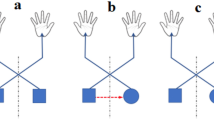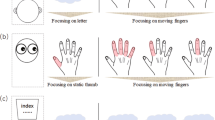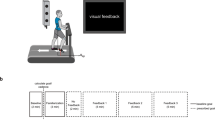Abstract
IN experiments that used a pencil and graph paper targets, we have been able to demonstrate what we believe to be the intermittency of visual feedback control in a simple motor task. The intermittency hypothesis was first advanced by Craik1. It was developed by E. R. F. W. Grossman and P. J. Goodeve in their theoretical analysis of movement control (unpublished), showing that an intermittent servo mechanism could produce results obtained by Fitts and others that related the speed of movement to the terminal accuracy.
This is a preview of subscription content, access via your institution
Access options
Subscribe to this journal
Receive 51 print issues and online access
$199.00 per year
only $3.90 per issue
Buy this article
- Purchase on Springer Link
- Instant access to full article PDF
Prices may be subject to local taxes which are calculated during checkout
Similar content being viewed by others
References
Craik, K. J. W., Brit. J. Psychol., 38, 56 (1947).
Keele, S. W., and Posner, M. I., J. Exp. Psychol., 77 (1), 155 (1968).
Vince, M. A., Quart. J. Exp. Psychol., 1, 85 (1948).
Author information
Authors and Affiliations
Rights and permissions
About this article
Cite this article
BEGGS, W., HOWARTH, C. Movement Control in a Repetitive Motor Task. Nature 225, 752–753 (1970). https://doi.org/10.1038/225752a0
Received:
Revised:
Issue Date:
DOI: https://doi.org/10.1038/225752a0
This article is cited by
-
Kinematics of direct reaching in head-mounted and stereoscopic widescreen virtual environments
Virtual Reality (2021)
-
An optimal velocity for online limb-target regulation processes?
Experimental Brain Research (2017)
-
Additional load decreases movement time in the wrist but not in arm movements at ID 6
Experimental Brain Research (2013)
-
Modification of Pointing Performance in Altered Gravitational Environments
Microgravity Science and Technology (2010)
-
Involvement of the autonomic nervous system in motor adaptation: acceleration or error reduction?
Experimental Brain Research (2009)
Comments
By submitting a comment you agree to abide by our Terms and Community Guidelines. If you find something abusive or that does not comply with our terms or guidelines please flag it as inappropriate.



